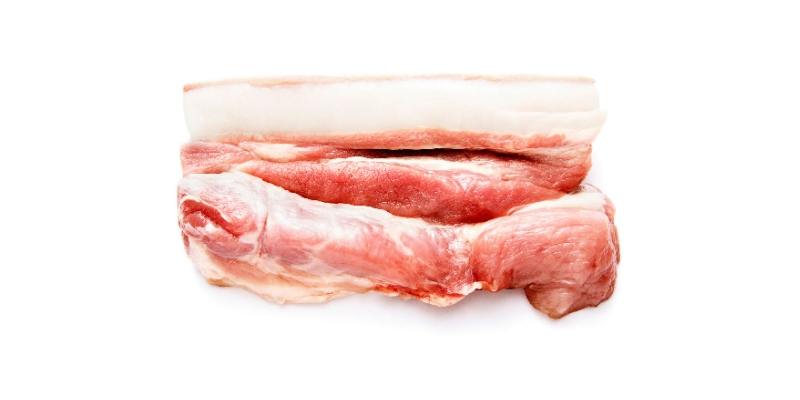Pork is amongst the most popular red mears out there and we, humans, occasionally love to enjoy and juicy pork rib barbecue, exquisite pork hams or maple syrup glazed pieces of crunchy bacon. And, of course, it’s natural for any dog owner to strive to share the joy of pork-eating with their pets.
And since dogs are direct descendants from carnivore wolves, we often think that any meat will do good for our pups. However, there’s no straight answer to a question if dogs can eat pork. So we’ve tried to dive in deeper in this guide and get some facts straight, to help you make an informed decision on the subject. Let’s start with those ribs…
Do you have a specific question about the subject? Then use the table of contents below to jump to the most relevant section. And you can always go back by clicking on the black arrow in the right bottom corner of the page. Also, please note that some of the links in this article may be affiliate links. For more details, check the Disclosure section at the bottom of the page.
Can dogs eat pork bones?
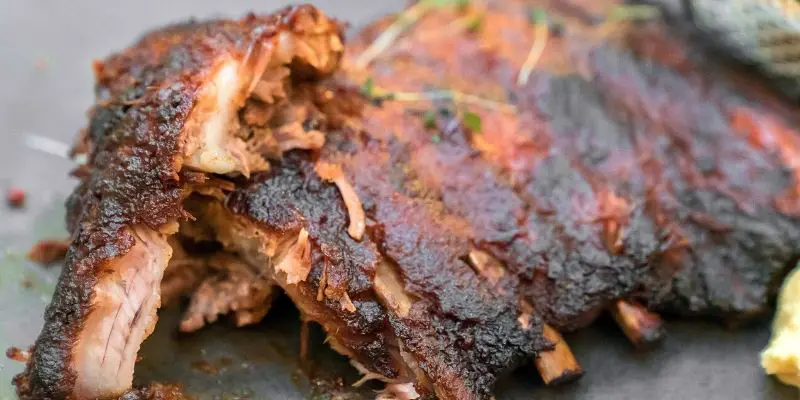
Bones (as well as a bone broth!) are a good source of nutrients and can be handy in satisfying your canines’ appetite. Chewing incites saliva enzymes and aids to prevent gum diseases and plaque development on teeth. And a dog munching on a bone is less likely to scratch or lick his paws.
It’s vital, though, not to give your dog the wrong type of bone.
What can be wrong with bones? Well, if those are smaller than your pup’s mouth that they may eat it whole. Especially rib bones of any kind, that are likely to break or get stuck in your dog’s throat (including pork ribs of course!).
Even big “round” bones are not entirely safe too, as they can lead to broken teeth, diseases of the tooth root, ulcers, and other health issues. Overall, pork bones specifically are known for easily splinter and crack.
Bones, in fact, once broken down into smaller pieces, can obstruct the intestines and trigger very severe constipation. Or cause injuries of the mouth and inner organs, or can stay in the throat with deadly results.
So, even though it might seem like an alluring idea to throw your puppy that extra bone after supper, give it a second thought before you do. Yes, dogs love to chew on any bones, but pork bones are not 100 percent safe (cow would be a way better choice!).
If I share a bone with canine, can it be raw or cooked?
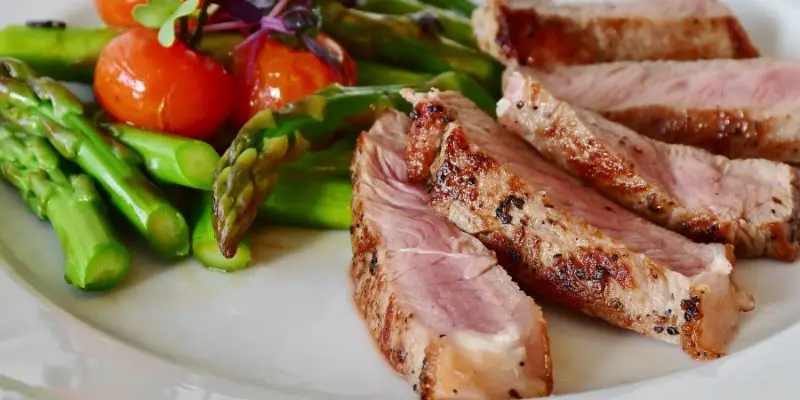
Let’s imagine that you’ve found that big and seemingly safe pork bone for your pup to chew and promise to keep an eye on him or her while they are playing with the treat.
In that case, should you go with the cooked or raw?
- Cooked bones are strictly forbidden. They splinter into shards right away, and that can provoke choking and severe injury of your pet’s throat, or intestines. Cooking can also eliminate some nutrients from the bone.
- Raw bones are less traumatic, but they cause news risks. They can bring food-borne parasites like Salmonella into your family, especially if those bones were set aside for a longer time. It can be extremely dangerous for your whole family (both pets and humans) particularly if anyone’s immune system is weak due to a current or recent illness. Give your vet a call and discuss if the potential benefits of pork bones for your pup will beat all the possible dangers.
If you are wondering if raw steak bones are any different check our guide “Can dogs eat steak?”.
Can dogs eat pork ham, bacon, or sausages?

No, absolutely no. The pork itself is too fat, but ham bacon and sausages are even fattier. And also way high on salt. Such a combination can be too much for a dog’s stomach to handle. Your dog will become dehydrated, therefore start drinking plenty of water. This, therefore, will fill pup’s belly with gas and liquid, pressuring the neighboring organs. In some severe cases that bloat can be deadly. Yes, we are being a bit extreme here. However, we’d like you to see all the potential risks of sharing those super salty and super fatty products with your pet.
And, the cherry on the top, several years ago, the World Health Organization discovered and shared with the world the fact that processed meats are carcinogens associated with cancer. The research was related to humans of course, but if our bodies can’t deal with processed meat, it’s even harder for delicate pup’s stomachs.
Can dogs eat pork meat and fat?
Pork nutritional value
In 100g of ground pork (which is the balanced mixture between pork’s lean meat and fats) is 16.96g protein, 19.64g fats (including 7.14g of not that great saturated fats), 18mg calcium. It also has 71mg of Cholesterol and 67mg of Sodium.
Sounds great, right? But there are still so many problems with pork, apart from being too fatty (straight road to pancreatitis).

Reasons why pork can be dangerous for dogs
Most of us heard that sharing the pork with canine might be dangerous because of the “pork worm” called Trichinella spiralis. It causes Trichinosis, a parasitic disease, both in dogs and people.
Usually, there are no symptoms of the disease in pups, and it often goes undiagnosed. But it can be harmful, followed by very severe body muscles inflammation as the parasite settles inside various body tissues. Puppies are usually at higher risk of contamination than grown dogs.
But, let’s be frank, even though sporadic outbreaks still occur the incidence of Trichinella spiralis infection in humans and swine has declined markedly in North America over the past 20 years.
Here’s the map of the recent cases in the US.

But there’s much more in pork than Trichinella spiralis.
According to this research, 69% of pork samples returned positive results during the testing for Yersinia enterocolitica, a bug responsible for 100,000 causes of infections in Americans per year.
And some more parasites were discovered during the testing including staph, salmonella, Enterococcus, and listeria.
Only 23% of tested pork were parasites free.
On top of it in 20% of samples, the researchers also discovered the drug called ractopamine. It promotes lean muscle growth in pigs and banned in many countries because of safety concerns. And even though it’s approved in the U.S., the drug like this may cause anxiety, restlessness, and an accelerated heart rate. And that’s something you probably won’t want both in dogs and humans.
Not all of these bacteria are necessarily right away deadly for dogs (or even people). For instance, Yersinia enterocolitica sits in our bodies for years, doing nothing. However, as it was established that it may cause the development of various inflammations, e.g., arthritis.
So can dogs eat pork raw or cooked?

Eating raw pork is not safe due to all previously mentioned parasites. To protect the health of your family members, be sure to prepare the pork to at least 145°F of internal temperature for roasts and 160°F for grounded meat.
And of course, you have to keep it simple: leave off all the add-ons people tend to cook with. Including potentially dangerous seasonings and spice rubs, like onion and garlic powder, nutmeg, excessive amounts of salts, etc. If you like to use BBQ sauce and other condiments, you have to remember that those should be avoided for dishes intended to be shared with your dog. Those are high in sugar and salt and in most cases include even more questionable ingredients.
Is pork bad for dogs? (+ related F.A.Q)
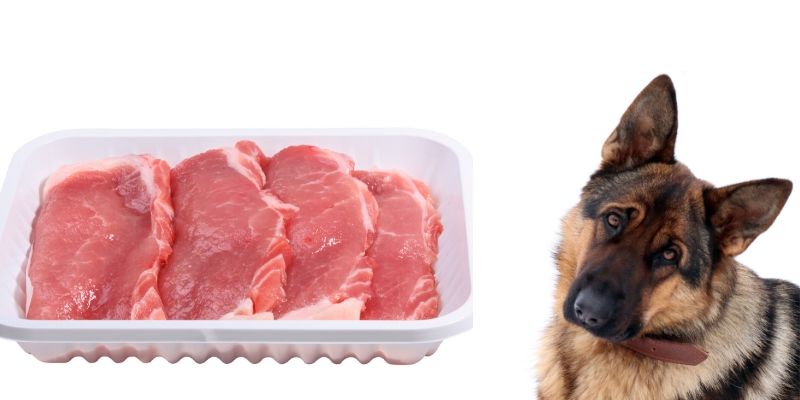
Plain pork ( not spices or sauces) is okay for canines to eat. But it has to be shared moderation and only on an occasional basis.
However, that doesn’t suggest that pork is a healthy addition to your pet’s diet. Pork fat can be challenging for a dog’s digestive system to deal with, and that can trigger the whole range of gastrointestinal problems and even lead to pancreatitis.
And, of course, never feed your pup with raw or undercooked pork, as we’ve discussed earlier. Pork bones are potentially unsafe as they can shatter inside the dog. The high salt and fat in bacon, sausages and ham can also be VERY unhealthy for dogs. So, there’s not that much you do about sharing the pork with your pooch.
Can dogs eat pork if they have kidney disease?
Pup’s chances for pancreatitis are higher if your dog has kidney disease. Therefore consumption of extra-fatty foods, including pork, maybe not good for pet’s health and even fatal in the long run. This, though, does not suggest that you do not supply your dog with fat-containing foods. You still should because fats are critical nutritious blocks of your pup’s health. But you have to reduce its overall intake, and therefore fats from the pork might not be your best choice for a diet of a pup with kidney disease.
Another thing worth mentioning is the recent study from the Lerner Research Institute. The whole gang of scientists worked a lot to identify that consumption of red meat induces an atherogenic gut microbial pathway in humans. L-carnitine from such diet converts into atherosclerosis- and thrombosis-promoting metabolite, contributing to heart failure, chronic kidney disease, heart attacks, and strokes.
Of course, we can’t 100% extrapolate it on dogs, but similarities in our bodies reaction to things are there. So, it’s just another piece of data you have to be aware of to make an informed decision about your pet’s nutrition.
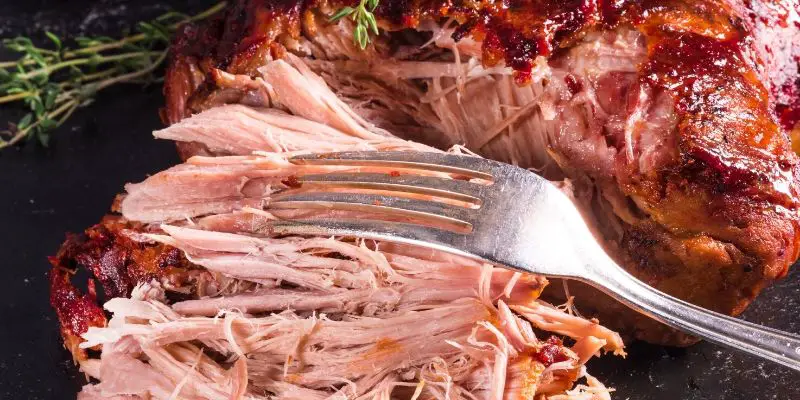
Can dogs be allergic to pork bones, flesh or fat?
It’s possible, as it’s one of the most common meat allergies along with rabbit and lamb. So in case when dogs eat the pork for the first time, you start with the smallest serving size possible. Check that he doesn’t show any troubling issues before serving him pork again.
What’ the best way to treat a dog that ate raw pork?
- First, observe your pup for the next 24-48 hours.
- Look for the symptoms like vomiting, muscle pain and stiffness, diarrhea, and anything else that might seem unusual.
- If your dog shows any of these signs after eating raw pork, immediately schedule an appointment with your vet to check up on your pet’s health.
Can dogs eat pork dog food and treats?
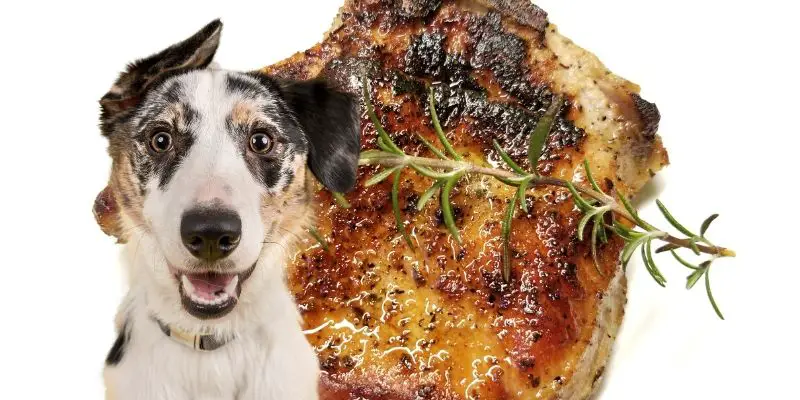
With all the dangers of pork eating we’ve discussed above, there are still some potential benefits in feeding your pup this meat. For instance, it’s a less commonly fed protein, much rarer than beef or chicken, so it might be an excellent option to try if your pup exhibits intolerances to other types of meat. It is also a great source of zinc and essential B vitamins (and lots of other nutrients). And dogs tend to work hard for a pork treat because it’s smelly and palatable, meaning it’s great for positive reinforcement training. But despite these advantages, the high-fat content of pork and all the parasites dangers implies that there are far healthier alternatives.
So if your pet is getting tired of the chicken and beef, it might be worthy of having a look to a specially formulated dog pork-based recipes.
After crawling the Amazon, we’ve come up with this shortlist of best pork food for dog:
Dry pork meal food by Earthborn Holistic Venture
This dry food has an impressive natural ingredients list including assortment of meats (pork, beef, lamb) and veggies (peas, sweet potatoes) and it’s fortified with lots of nutrients: Vitamin E, Vitamin A, Vitamin B12 and more. So, it’s a good idea to introduce this product to your pet’s nutrition if he or she is sensitive to poultry and egg products or you’d like to vary pup’s menu with pork. Check more reviews .
Pork Liver canned dog food by Wellness CORE
Maybe this is not the cheapest food, but it reportedly made some miracles even to pups with easily distressed bellies. It produced with all natural premium ingredients including meat (turkey, pork, duck), veggies (carrots, sweet Potatoes, kale, broccoli, spinach and more) and the whole list (a couple of dozens!) nutrients promoting healthy bowel movements, shiny coats, and overall pup’s well-being. As some pet owners shared in their case, it could even beat the more expensive prescribed dog food. Check more reviews .
Freeze dried pork liver dog treats by Pro-Treat
Those are crazy delicious, and your pup might be going bananas for those treats. It is made with a single ingredient – pork liver, the leaner, less fat part of the animal. The treats are easy to chew or to cut into smaller pieces, pure, without additives, and produced in the USA. Check more reviews .
Pig ear strips
There’s a high chance that your pup will absolutely LOVE it – those are so much more fun and safe than chewing bones. Those are gentle on your dog’s stomach because they are made of only pig ears, making them easier to digest than other regular treats. It’s a perfectly healthy protein packed snack that will also help clean your dog’s teeth. They also come in different sizes to suit my large and small dog. Check more reviews .
Dogs and pork. Summary
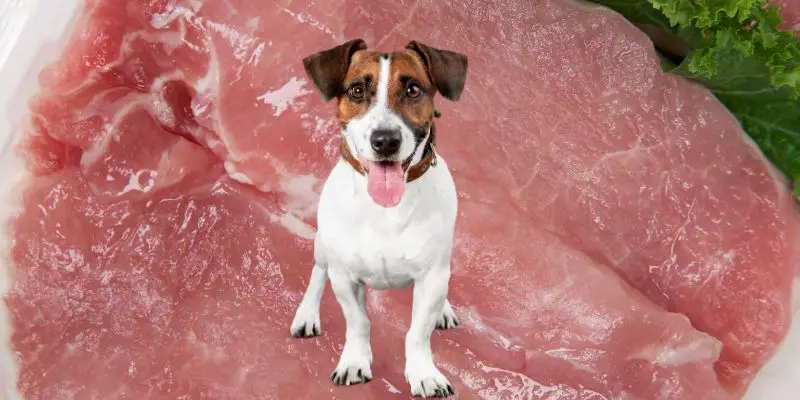
It’s fine to feed your dogs a small portion of pork. However, it’s not necessarily the best food choice. If you go for it still, remember, that the pork must be fully cooked with no any additives, salt, onion, or peppers, or anything else, before you give it to your pup. Although pork is a good source of protein, it’s also too fatty, and that may provoke indigestion. Don’t serve your canine minced pork mixed with garlic or onion powder. These seasonings are poisonous and can harm your pup’s red blood cells.
Also, if the pork is undercooked, it puts your pet at danger for trichinosis, a bacterial infection that triggers the quite severe gastrointestinal disease. And there’s a high chance that your pup may catch the whole rainbow of other worms: from staph to salmonella and listeria. So, maybe it makes sense to skip the pork or stick with pork-based dog food for the sake of your four-legged friend well-being.
Thanks for the blog graphics: Canva.com

